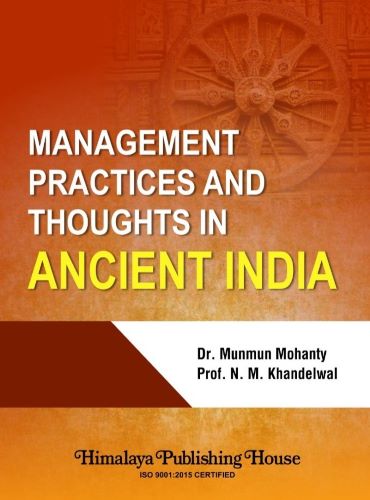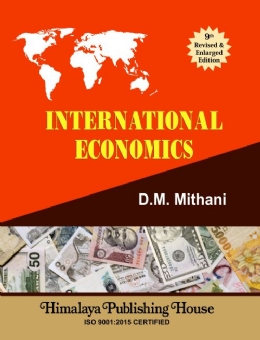In ancient India, business practices were deeply rooted in ethical principles and a holistic understanding of the interconnectedness of all aspects of life. The foundation of business activities were moral values, integrity, and fairness. This book aims to explore our deep-rooted traditions to discover potential answers in ancient texts, such as the Vedas, to challenges that contemporary individuals encounter in performing their managerial duties. The book presents the topic of Management Practices and Thoughts in Ancient India in essentially eleven chapters covering topics such as the corpus of literature in Indian Knowledge System and the Astadasha Vidya, the economic system and the corporate forms of various organisations that prevailed in ancient India, the evolution of management thought in India, the management lessons embedded in the core Sanatan Literature such as the Bhagavad Gita, the Mahabharat and the Ramayana. The book also discusses the management lessons in one of the most important non-religious works on statecraft, Kautilya’s Arthashastra as well as the management lessons in Jain and Buddhist Literature. This book is primarily written for the postgraduate students of management. But we hope that it will appeal to a wider audience including the students of Economics and Commerce, business professionals, policy makers and researchers.
Contents –
1. ANCIENT INDIANWISDOM
1. Introduction to Ancient Indian Civilisation
1.1 The Indus valley civilisation
1.2 The Vedic civilisation
1.3 The birth of other religions
2. Ancient Indian Knowledge
3. The Indian Knowledge System
4. The Corpus of Indian Knowledge
4.1 Chaturdasa Vidyasthana
4.1.1 The Vedas
4.1.2 The Vedangas
4.1.3 Puranas and Itihasas
4.1.4 The six philosophical schools —Ṣaḍ Darśanas
4.1.5 The Dharmaśāstras
5. Conclusion
2. ECONOMY IN ANCIENT INDIA
1. Introduction
1.1 Concept of wealth in ancient India
1.2 Position of wealth in ancient India
2. Overview of Economy in Ancient India
3. Factors Contributing to India’s Economic Prowess
3.1 Agriculture and food production
3.2 Industry
3.3 Trade
3.3.1 Uttarapatha and Dakshinapatha
3.3.2 Spice route
3.3.3 Silk Route
3.3.4. Incense trade route
3.3.5. Cotton trade route
3.3.6. Grand trunk road
4. Ethics in Economy
4.1 Basic features of ancient Indian economy
4.1.1 Family base
4.1.2 Savings oriented
4.1.3 Entrepreneurship/Self-employment
4.1.4 Community orientation and social capital
4.1.5 Driven by norms and values
3. CORPORATE LIFE IN ANCIENT INDIA
1. Introduction
2. The Vedic Varna System and Corporate Life
2.1 Corporate Life in Brahmanas
2.2 Corporate life in Kshartiyas
2.3 Corporate life in vaishyas
2.4 Corporate life in shudras
3. Conflicts, Alliances and Social Concerns
4. Trade and Corporate Life
4.1 The characteristics of ancient Indian corporation, the Sreni
4.2 Functions of Srenis
4. EVOLUTION OF INDIAN MANAGEMENT THOUGHT
1. Introduction
2. Precursor to Management in Ancient India
3. Ancient Indian Wisdom
4. Objective of Management in India
4.1 The stakeholder value creation
4.2 Individual freedom
4.3 Group behaviour
4.4 Ethics
4.5 Issues relating to gender
5. Management in Ancient India
5.1 Origin of king, his attributes, roles and responsibilities from Manusmriti
5.2 Ideal or role model king — Valmiki Ramayana Epic
5.3 Attributes of a king, his roles and responsibilities in Mahabharata
5.4 Attributes, roles and responsibilities of king — Kautilyan state
5.5 Essence of Indian management
6. Western Management Models
7. Need of India Oriented Approach
7.1 Duality of life
7.2 Deprived meaning at work
7.3 Unsustainable operations
8. Can we Successfully Adopt the Western Models?
9. Indian Solution
9.1 Value oriented holistic management
9.2 Spirituality in management
5. MANAGEMENT CONCEPTS IN BHAGAVAD GITA
1. Introduction
1.1 Overview of Bhagavad Gita
2. Kith and kin dilemma and lessons for decision-making
3. Karma Yoga —Work ethics
3.1 Qualities and behaviour of an excellent performer
3.2 Root cause of disequilibrium or poor performance
3.3 Action-inaction
3.4 Action-non-action
3.5 Karma yoga Vs. Karma sanyasa (Renouncement of karma)
4. Leadership Lessons in Bhagavad Gita
4.1 Non-attachment
4.2 Instrumentality
4.3 Selflessness
4.4 Learning and adapting
4.5 Leading by example
4.6 Equanimity
5. The Trinity Theory of Leadership
6. Motivation in Bhagavad Gita
6.1 A master of listening
6.2 Offering encouragement
6.3 Use appropriate motivator
6.4 Giving direction
6. MANAGEMENT LESSONS IN MAHABHARATA
1. Introduction to ved vyasa
2. Introduction to Mahabharata epic
3. Ethics and Moral Values in Mahabharata
3.1 Dharma and ethics
3.2 Lessons in business ethics
4. Management of Self (Soul) in Mahabharata
5. Governance and Public Administration
5.1 The government
5.2 Justice and Dandniti
6. Vidurniti and Management Lessons
7. MANAGEMENT LESSONS IN RAMAYANA
1. The First Epic – Adikavya
2. Valmiki, the Adikavi
3. Ramayana, The Epic
4. Lessons in ethics from Ramayana
5. Leadership Lessons from Ramayana
5.1 Leading by example
5.2 Participative
5.3 Humility and code of conduct
5.4 Free from biases
5.5 Clear vision
5.6 Integrity
5.7 Continuous learning
5.8 Inspiring
5.9 Empathy
6. Governance in Ramayana
6.1 Stress on secrecy in conduct of state actions
6.2 Focus on merit of state employees
6.3 Monitoring of state activities
6.4 Presence of rule of law
6.5 Personal conduct of a leader in society
7. Strategic Alliance in Ramayan
8. Effective Communication Lessons from Ramayana
9. Conclusion
8. INTRODUCTION TO KAUTILYA’S ARTHASHASTRA
1. Introduction
2. Brief background of Kautilya
2.1 Political landscape and rise to power
3. Charvaka and the Arthashastra
4. The Scope of Arthashastra
5. Theme of Arthashastra
5.1 Chapter description of Arthashatra
6. The Saptanga theory of Chanakya
7. A brief description of Kautilyan society
8. An introduction to Kautilyan economy
8.1 Economic administration
9. MANAGEMENT CONCEPTS IN ARTHASHASTRA
1. Introduction
2. Principles of general management and administration in Arthashastra
2.1 Division of labour
2.2 Heirarchy
2.3 Unity of command
2.4 Centralisation Vs. decentralisation
2.5 Authority and accountability
2.6 Precedence of organisational interest over an individual
2.7 Discipline
2.8 Co-ordination
2.9 Direction
2.10 Control
2.11 Motivation
3. Leadership in Arthashastra
3.1 The intellectual leader of Arthashastra
3.2 Qualities of a leader
3.2.1 Control over senses
3.2.2 Prioritising your team
3.2.3 Leaders should Be approachable
3.2.4 Fix accountability
3.2.5 Timely action
4. Human resource management in Arthashastra
4.1 Training, recruitment and selection in Arthashastra
4.2 Recruitment and selection process
5. Financial management concepts in Arthashastra
5.1 Pursuit of wealth
5.1.1 Engaging in active earnings
5.1.2 The significance of investment
5.1.3 The need for financial strategy
5.1.4 The value of continuous upskilling
5.2 The power of compounding
5.3 Staying debt free
5.4 Risk Appetite and Analysis
5.5 Diversification of Risk
5.6 Impulsive spending
5.7 Wealth and Ethics
10. MANAGEMENT CONCEPTS IN JAIN LITERATURE
1. Introduction to Jainism
1.1 The Mahāvīra
1.2 The Thirthankaras
1.3 Basic tenets of Jainism
1.4 Sects of Jainism
2. Jain Literature
2.1 The Agamas
2.2 The Non-Agamas
2.3 Other literary works
3. Contribution of Jainism to Management
3.1 Panchsheela code of conduct
3.1.1 Satya (truth)
3.1.2 Ahimsa (non-violence)
3.1.3 Achaurya/Asteya (Non-stealing)
3.1.4 Aparigraha (Non-attachment/Non-possession)
3.1.5 Brahmacharya (Abstinence)
3.2 The principle of forgiveness and compassion
4. Jainism and Business Ethics
4.1 Truth and business ethics
4.2 Non-violence and business ethics
4.3 Non-stealing and business ethics
4.4 Non-possession and business ethics
4.5 Abstinence and business ethics
4.6 Jainism and modern corporate world
5. Jainism and Sustainability Management
5.1 The orientation of Jain philosophy towards sustainability
6. Leadership in Jain Philosophy
6.1 Jin theory of leadership
6.1.1 Equanimity or Sambhav (The state of being balanced in success and failure)
6.2 Ten qualities for a monk or manager
6.3 Ratantrayi or three jewels for a leader
7. Jainism and Workforce Management
7.1 Classification of workforce in ‘Sthanag Sutra’
8. Mahavira’s Economics
8.1 Economic ideas of Mahavira
8.2 Elements of modern economics
8.3 Economics of Mahavira
8.4 The central focus of Mahavira’s principles: Man or money
8.5 The basic difference
9. Conclusion
11. MANAGEMENT CONCEPTS IN BUDDHIST LITERATURE
1. Introduction to Buddhism
1.1 Life of Buddha
1.2 The basic tenets of Buddhism
1.3 The different schools of Buddhism
1.4 Spread of Buddhism
1.5 Impact of Buddhism on Indian culture
1.6 Overview of Buddhist literature
1.6.1 Canonical literature
1.6.2 Non-canonical literature
2. Management Lessons in Buddhism
2.1 Team building in Buddhism
2.2 Leadership in Buddhism
2.3 Personal development of team members in Buddhism5
2.4 Knowledge management in Buddhism
2.4.1 What is knowledge management?
2.4.2 Implications of Buddhism on knowledge management
2.4.3 Examples from corporate sector







Your review is awaiting approval
Hello there! Do you know if they make any plugins to
assist with Search Engine Optimization? I’m trying to get my website to rank for some targeted keywords but I’m not seeing very good success.
If you know of any please share. Many thanks!
I saw similar blog here: Eco wool
Himalaya Publication –
Professor N M Khandelwal and Dr. Munmum Mohanty’s new book “Management Practices And Thoughts In Ancient India” is one more feather to their hat. Prof Khandelwal is my mentor and was a guide for my Ph.D. At that time we call him alive and moving library as we find him always ready in giving whatever information we need in our research.
As a text book this book will prove to be very useful for the students and teachers as it covers almost all the areas of management of ancient India like history and economy in ancient India and its evolution and corporate management. too. Apart from this it also discussed management concepts of Mahabharat and Ramayan and Buddhist literature also.
Management concepts of Bhagvadgeeta are given in the book very beautifully by introducing the whole Geeta by describing the message of all the 18.. chapters including karmayog with leadership and motivation concepts in Geeta. Thus Geeta is a wonderful story of motivation where in the beginning Arjun says, “I will not fight” and after Krishna’s discorse at the end he says “Karshye tav vachanam” without any external motivation or extra monetary offers. This management practice prevais in India
As the book is written by keeping syllabus in mind the authors might have felt certain limitations but there is no doubt about the book being popular among the students, teachers and researchers.
I congratulate both the authors of the book for their valuable contribution to the Ancient India’s literature of management practices.
Prof. (Dr.) Nalini V Dave. (Retd)
Dept. of Com. & Busi. Ad.
Saurashtra University, Rajkot.